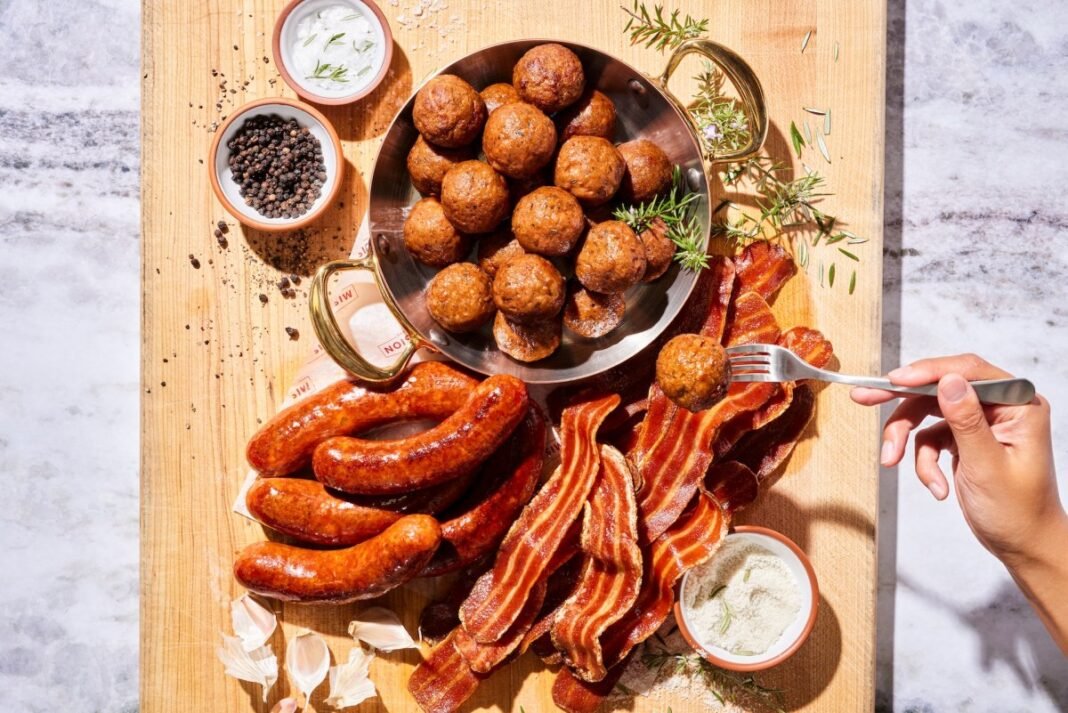Transforming Plant-Based Meat with Lab-Grown Pork Fat
The Emergence of Animal-Free Fat in alternative Proteins
Craving the savory richness of ground beef while sticking to a vegetarian lifestyle can be challenging.One creative solution involved cooking a plant-based burger alongside traditional beef patties, allowing the flavorful drippings to infuse the veggie option. This simple method underscores how essential fat is in replicating authentic meat taste.
Expanding on this idea, Mission Barns has achieved a groundbreaking feat by producing cultured pork fat without using animals. Recently authorized by the U.S. Department of Agriculture, this innovation represents the first cultured animal fat available for consumers, paving the way for more tasty and satisfying meat substitutes.
The Importance of Cultured Fat in Modern meat Alternatives
The pursuit of lab-grown meat has spanned over ten years as the debut of the first cultivated burger in 2013, which cost over $300,000 to produce.Even though expenses have significantly decreased as then, growing muscle tissue remains costly due to its complex requirements-muscle cells need scaffolding structures for proper progress unlike many other cell types grown suspended in liquid media.
In contrast, fat cells are simpler and less resource-intensive to cultivate at scale and affordable prices. Beyond economics,fat plays a vital role by delivering much of the flavor and texture that consumers associate with traditional meats.
How Cultured pork Fat Is Created
The process begins with extracting a small biopsy from a live pig to harvest precursor cells. These cells are cultivated inside specially designed bioreactors filled with nutrient-rich growth media optimized for adipose (fat) cell development. Since fat cells naturally float rather than remain evenly suspended like muscle cells, Mission Barns engineered unique bioreactors that keep these cells uniformly distributed throughout the medium-preventing clumping that could deprive some cells of nutrients.
Wide-Ranging Uses: From Plant-Based Bacon to Custom Blends
Mission Barns’ initial product lineup includes bacon alternatives and also sausage and meatball items made from pea protein combined with thier cultured pork fat. By supplying this ingredient to other food manufacturers rather than focusing solely on finished products themselves, they aim to become an essential component supplier within alternative protein markets.
- Bacon substitutes: Replicating crispy textures enhanced by genuine pork flavor derived from cultured fats
- Sausages & Meatballs: Combining plant proteins with real animal fats for richer taste experiences
- Custom formulations: Partner companies can tailor recipes using Mission Barns’ fats targeting specific flavors or nutritional objectives
A Nutritional Advantage Within Alternative Meats
Cultured pork fat not only elevates flavor but also reduces dependence on artificial additives often used today-such as synthetic flavors designed to mask off-notes from pea protein or other bases. Moreover, adjusting what these fats consume during cultivation allows enhancement of their nutritional profile; increasing omega-3 fatty acids content could make these products heart-healthier compared with conventional options high in saturated fats and sodium.
Pioneering Future Flavors: Enhancing Taste While Boosting Health Benefits
Missions ahead include developing varieties of pork fat featuring intensified flavors reminiscent of luxurious seafood oils like salmon roe-but produced entirely through cellular agriculture methods. Such advancements would enable manufacturers to use smaller quantities while achieving stronger sensory impact-a win-win scenario combining indulgence with improved nutrition.
“The excitement among potential partners is unmistakable-they’re eager for access,” shared leadership at Mission barns.
A Sustainable Shift Reshaping Food Production Worldwide
This breakthrough comes amid rising global demand for sustainable protein sources; projections indicate alternative proteins will capture more than 10% market share globally within five years due partly to environmental concerns linked with livestock farming-including greenhouse gas emissions responsible for nearly 15% of worldwide CO2-equivalent output according to recent climate assessments.
Cultivated animal fats form an integral part of this broader movement toward lowering ecological footprints while preserving culinary satisfaction-a key driver behind consumer acceptance beyond ethical considerations alone.





